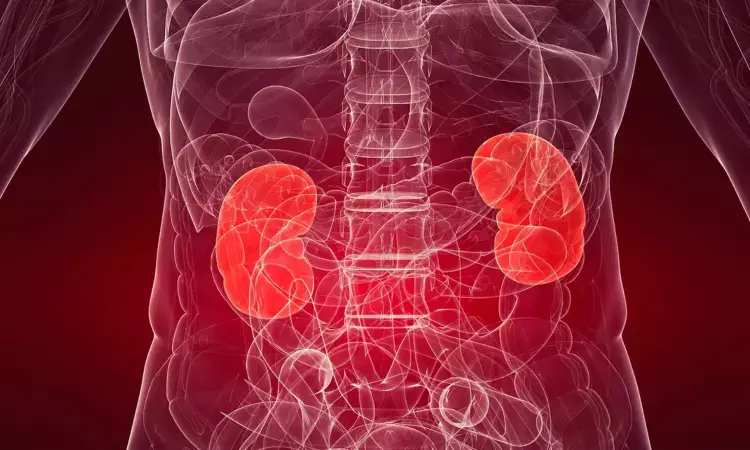- Home
- Medical news & Guidelines
- Anesthesiology
- Cardiology and CTVS
- Critical Care
- Dentistry
- Dermatology
- Diabetes and Endocrinology
- ENT
- Gastroenterology
- Medicine
- Nephrology
- Neurology
- Obstretics-Gynaecology
- Oncology
- Ophthalmology
- Orthopaedics
- Pediatrics-Neonatology
- Psychiatry
- Pulmonology
- Radiology
- Surgery
- Urology
- Laboratory Medicine
- Diet
- Nursing
- Paramedical
- Physiotherapy
- Health news
- Fact Check
- Bone Health Fact Check
- Brain Health Fact Check
- Cancer Related Fact Check
- Child Care Fact Check
- Dental and oral health fact check
- Diabetes and metabolic health fact check
- Diet and Nutrition Fact Check
- Eye and ENT Care Fact Check
- Fitness fact check
- Gut health fact check
- Heart health fact check
- Kidney health fact check
- Medical education fact check
- Men's health fact check
- Respiratory fact check
- Skin and hair care fact check
- Vaccine and Immunization fact check
- Women's health fact check
- AYUSH
- State News
- Andaman and Nicobar Islands
- Andhra Pradesh
- Arunachal Pradesh
- Assam
- Bihar
- Chandigarh
- Chattisgarh
- Dadra and Nagar Haveli
- Daman and Diu
- Delhi
- Goa
- Gujarat
- Haryana
- Himachal Pradesh
- Jammu & Kashmir
- Jharkhand
- Karnataka
- Kerala
- Ladakh
- Lakshadweep
- Madhya Pradesh
- Maharashtra
- Manipur
- Meghalaya
- Mizoram
- Nagaland
- Odisha
- Puducherry
- Punjab
- Rajasthan
- Sikkim
- Tamil Nadu
- Telangana
- Tripura
- Uttar Pradesh
- Uttrakhand
- West Bengal
- Medical Education
- Industry
Vancomycin Linked to Higher AKI Risk in ICU Patients: Study

A recent target trial emulation study found that vancomycin use in ICU patients is associated with a higher risk of acute kidney injury compared to alternatives such as clindamycin and linezolid, highlighting the importance of following established prevention strategies. The study was published in Pharmacoepidemiology & Drug Safety journal by Izak A. and colleagues.
The analysis was founded on a hypothetical trial simulation employing routinely collected data from 15 Dutch ICUs over the period between 2010 and 2019. The data of 1,809 ICU admissions were analyzed. Patients who underwent vancomycin were compared with those that were treated with other minimally nephrotoxic antibiotics, such as clindamycin, linezolid, teicoplanin, meropenem, cefazolin, and daptomycin.
Acute kidney injury was classified based on the KDIGO serum creatinine criteria. To adjust for confounding and selection bias, inverse probability of treatment and censoring weighting was used in the analysis. Risk estimates were reported at 2 days and 14 days after the start of antibiotics, taking into consideration the 24–48 hour delay between renal function worsening and detection by SCr.
Results
The analysis revealed that vancomycin use was not related to a higher risk of AKI in the first 2 days.
In 2 days, AKI risk was 0.10 (95% CI 0.06–0.12) among vancomycin users compared with 0.10 (95% CI 0.08–0.11) among alternative antibiotic users, with a risk difference of 0.00 (95% CI −0.03–0.03).
By day 14, a definitive difference had emerged. The risk adjusted for AKI was 0.28 (95% CI 0.21–0.34) for vancomycin versus 0.17 (95% CI 0.14–0.20) for the alternative antibiotic.
This represented a risk difference of 0.11 (95% CI 0.04–0.19), meaning that vancomycin was linked to a much increased risk of kidney damage over time.
The research concluded that vancomycin was associated with a higher risk of acute kidney injury in comparison to other antibiotics when administered for 14 days in ICU patients. The authors suggest strict compliance with vancomycin-induced AKI preventive protocols and that less nephrotoxic alternatives should be considered where possible in order to protect renal function in critically ill patients.
Reference:
Yasrebi-de Kom, I. A. R., Jager, K. J., Stel, V. S., Chesnaye, N. C., Abu-Hanna, A., de Keizer, N. F., de Lange, D. W., Dongelmans, D. A., Klopotowska, J. E., Cinà, G., & the RESCUE Study Group. (2025). Vancomycin‐induced acute kidney injury in intensive care patients: A target trial emulation study using multicenter routinely collected data. Pharmacoepidemiology and Drug Safety, 34(9). https://doi.org/10.1002/pds.70205
Dr Riya Dave has completed dentistry from Gujarat University in 2022. She is a dentist and accomplished medical and scientific writer known for her commitment to bridging the gap between clinical expertise and accessible healthcare information. She has been actively involved in writing blogs related to health and wellness.
Dr Kamal Kant Kohli-MBBS, DTCD- a chest specialist with more than 30 years of practice and a flair for writing clinical articles, Dr Kamal Kant Kohli joined Medical Dialogues as a Chief Editor of Medical News. Besides writing articles, as an editor, he proofreads and verifies all the medical content published on Medical Dialogues including those coming from journals, studies,medical conferences,guidelines etc. Email: drkohli@medicaldialogues.in. Contact no. 011-43720751


